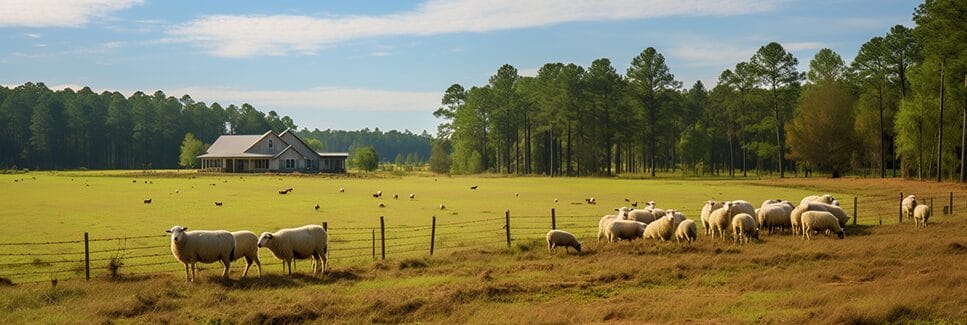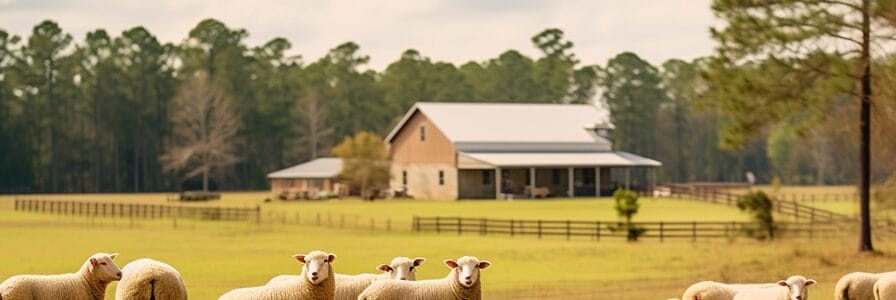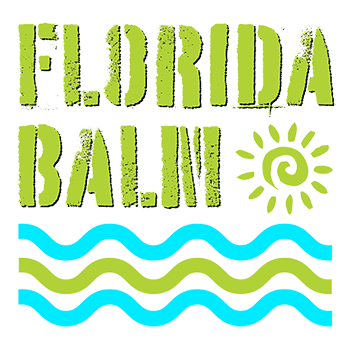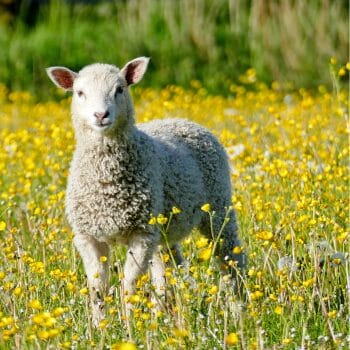
Sheep Farms in Florida!
We think sheep farms in Florida deserve some extra attention, so let’s explore what sheep farms in Florida do, how they make money, the products they produce, and highlight some of these sheep farms that sell to the public!
There are lots of people these days experiencing a renewed sense of the pioneer spirit… sheep farming in Florida could be a great answer to that call! There are multiple reasons to own sheep on your Florida land, so let’s talk about them!
Plus we’ve got some surprising sheep facts for you… like, did you know that sheep milk is widely accepted as the most nutritious milk for sale in the world today? And people who experience digestive issues consuming cow milk generally don’t have issues with sheep milk? Read on for more!

What Do Sheep Farms in Florida Do?
Sheep farms in Florida are involved in various agricultural activities, from raising sheep for meat and wool to breeding and selling livestock.
Here’s a closer look at the primary functions of sheep farms in Florida:
1. Meat Production: Many sheep farms in Florida raise sheep for their meat, known as lamb and mutton. Lamb is particularly popular in gourmet and ethnic cuisines, and there is a growing demand for locally sourced, high-quality meat.
2. Wool Production: Sheep wool is a versatile product used in textiles, clothing, and crafts. Some farms specialize in breeding sheep with high-quality wool, which is then sold to artisans and manufacturers.
3. Breeding and Livestock Sales: Sheep farms often breed their stock, selling lambs and adult sheep to other farmers and hobbyists. This is a crucial aspect of maintaining and expanding the sheep farming industry in Florida.
4. Agrotourism and Education: Many sheep farms have diversified into agrotourism, offering educational tours, farm stays, and hands-on activities to the public. This helps raise awareness about sustainable farming practices and provides additional income.
5. Sheepskin: Sheepskins are used in a variety of products, including rugs, clothing, and medical-grade sheepskin products.
6. Dairy Products: Some farms produce sheep milk, which is used to make cheese, yogurt, and other dairy products.
Did You Know? Sheep Milk versus Cow Milk
Sheep milk is much richer in nutrients and generally considered easier to digest than cow milk. It has a slightly sweeter taste and is ideal for making cheese, producing double the amount as cow or goat milk makes, per liter of milk used.
Cow milk is more affordable and the most widely available option because it is mass produced on an enormous scale. But the processing systems are causing growing concern among health-conscious people.
Methods of mass producing cow milk have caused concern most specifically about high levels of hormones (estrogen) as well as pesticides and antibiotics.
Sheep milk vs. cow milk:
- Fat Content: Higher in Sheep Milk (richer and creamier)
- Protein Content: Higher
- Lactose Content: Lower (may be easier to digest for some)
- Protein Type: More A2 protein (potentially easier to digest)
- Vitamins & Minerals: Higher in Vitamins A, B12, E, and calcium
And the health concerns surrounding cow’s milk extend to beef as well… so we should also talk about sheep meat (lamb, mutton), right?
Sheep Farms that Sell to the Public
Most sheep farms in Florida tend to be hidden gems, focused on raising their sheep instead of marketing their businesses.
Don’t get frustrated with them! They are experts at growing food, not at marketing or advertising or running an online shop. Most of their websites are very outdated, and many don’t have social media. So how can you support them, and buy sheep they may be breeding, or lamb they may be producing?
If they have an email sign-up, try that. Get on their list, and they’ll likely notify you of the farmer’s market(s) where they’ll be selling at. Most importantly, shop at your local farmer’s markets! If you have sheep farms in the area, chances are when they have product to sell, they’ll be there!
If you live in one of these locations, do what you can to support your neighbors. If they have a community event, go! If you see them selling at a local farmer’s market, buy something!
Florida needs to strengthen small family farming businesses so we have a stronger food supply chain through local communities!
- Shephards hill Farm (Lake City): Big working farm of sheep, cows and chickens plus vegetables. They sell locally at different locations, so visit their website and join their email list. https://www.shepherdshillfarmflorida.com
- A3 Farms (Melrose): Family farm specializing in fresh chicken eggs and meat, and USDA lamb cuts. They sell at local Farmer’s Markets. https://a3farms.com/
- Vera Farm Florida (Sebring): Family farm growing plants wholesale, and also raising sheep and mini donkeys. https://www.verafarmflorida.com/
- Linden Hollow Sheep Farm (St. Cloud): Sheep breeders who also specialize in herd training. https://www.lindenhollowsheepfarm.com/
How Small Sheep Farms in Florida Can Monetize
For those interested in starting a small sheep farm in Florida, there are multiple ways to generate income. Here are some potential income streams:
1. Direct Sales: Selling lamb meat, sheep milk, wool, and other products directly to consumers at farmers markets, online, or through local retailers can be profitable. Do your research on laws and licenses for the type of business you may be thinking about. Establishing a brand and a loyal customer base, plus solid consistent communication is key.
2. Value-Added Products: Creating and selling value-added products like artisanal cheese, wool crafts, and sheepskin items can significantly boost revenue.
3. Breeding and Livestock Sales: Selling high-quality breeding stock to other farmers can provide a steady income. Specializing in specific breeds known for their meat or wool quality can set a farm apart.
4. Agrotourism: Opening the farm to the public for tours, workshops, petting zoo or birthday parties and events can attract visitors and generate additional income. Farm stays and educational programs are also popular.
5. CSA Programs: Community Supported Agriculture (CSA) programs allow consumers to buy shares of the farm’s products in advance, providing the farm with upfront capital and a guaranteed market.
6. Grants and Subsidies: Exploring agricultural grants and subsidies available through state and federal programs can provide financial support for farm operations and expansions.
Florida Cracker Sheep History and Fun Facts!
Florida Cracker sheep are an integral part of the state’s agricultural history. These sheep are descendants of the original Spanish flocks brought to Florida in the 1500s.
They are well-adapted to the Florida climate and landscape, making them a popular choice for local farmers.
Florida Cracker sheep are known for their hardiness, disease resistance, and ability to thrive on sparse forage. Their historical significance and adaptability make them a valuable addition to any Florida farm.
The Florida Cracker Sheep are so important, there’s a Florida Cracker Sheep Association where you can learn more information about them here.
As an Amazon Associate I earn from qualifying purchases at no additional cost to you.
Costs and Land Requirements for Starting a Sheep Farm in Florida
Starting a sheep farm in Florida involves initial costs and considerations. Here are some key points to keep in mind:
Initial Investment: Purchasing sheep, especially high-quality breeding stock, can be a significant upfront cost. Florida Cracker sheep typically cost between $200 and $800 each, depending on age and quality.
Land Requirements: A general rule of thumb is to provide at least one acre of pasture per 2-5 sheep, though this number ranges higher depending on other factors. Florida Cracker sheep, being smaller and more efficient grazers, can thrive on less land compared to larger breeds.
Fencing and Shelter: Secure fencing is essential to protect sheep from predators and prevent them from wandering. Additionally, providing shelter from extreme weather is crucial for their well-being.
Feed and Pasture: While sheep can graze on pasture, supplemental feed may be necessary, especially during dry seasons.
- If you have good quality pasture year-round, grazing costs might be minimal. However, factor in potential hay supplementation during dry seasons or for breeding ewes. Hay costs can vary depending on quality and location, but estimate $50-$100 per sheep per year.
- Grain is not always necessary but might be beneficial for pregnant/lactating ewes or during growth periods. Estimate $20-$50 per sheep per year depending on usage.
Veterinary care: Vaccinations, and parasite control play an important role in how farms are managed, and depending on how you choose to raise your animals, these expenses will vary greatly.
Sheep farming in Florida is a multifaceted industry that offers numerous opportunities for both farmers and consumers. Whether you’re interested in purchasing fresh products from local organic farmers, or starting your own sheep farming venture, Florida’s sheep farms have something to offer.
By exploring the diverse income streams and embracing innovative practices, small sheep farms can thrive and contribute to the state’s vibrant agricultural community!
Bottom line? Start by visiting farmer’s markets and visiting your local farm if you have the chance. And if they have sheep, and sell sheep products or meats… even better!






